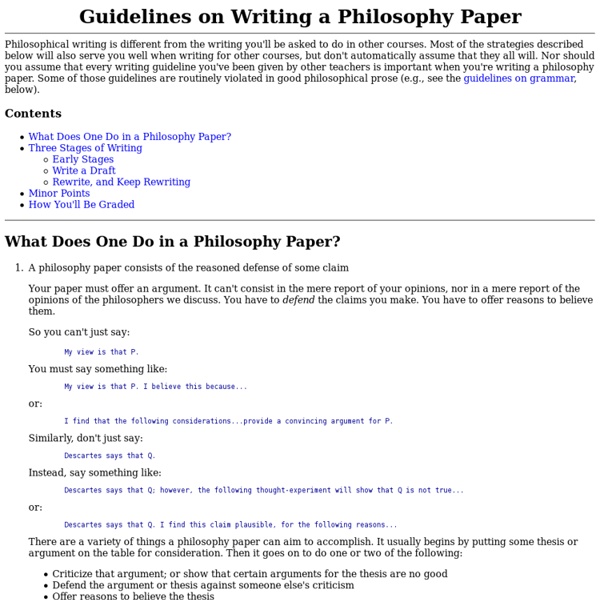Guidelines on Writing a Philosophy Paper

Guidelines on Reading Philosophy
It will be difficult for you to make sense of some of the articles we'll be reading. This is partly because they discuss abstract ideas that you're not accustomed to thinking about. They may also use technical vocabulary which is new to you. Sometimes it won't be obvious what the overall argument of the paper is supposed to be. The prose may be complicated, and you may need to pick the article apart sentence by sentence. Contents Skim the Article to Find its Conclusion and Get a Sense of its Structure A good way to begin when you're trying to read a difficult article is to first skim the article to identify what the author's main conclusion is. When you're skimming the article, try also to get a general sense of what's going on in each part of the discussion. The articles we read won't always have a straightforward structure. This is the conclusion I want you to accept. The conclusion I want you to accept is A. Articles can be complex in other ways, too. and so on.
The Best Resources On Teaching & Learning Critical Thinking In The Classroom
Teaching and learning critical thinking in the classroom will be the topic of my next Education Week Teacher column (contribute your ideas there, please), so I wanted to develop a “The Best…” list with supporting materials. I put out a call on Twitter and Google Plus for people to make suggestions, but unfortunately didn’t do a great job of keeping track who made the suggestions. I apologize if I did not credit you for your suggestion. I’ll keep much better track the next time I put out a similar request. I hope readers will contribute additional suggestions. You might also be interested in: The Best Sites For Cooperative Learning Ideas The Best Resources For Helping Teachers Use Bloom’s Taxonomy In The Classroom The Best Sites For Students To Create & Participate In Online Debates The Best Tools To Help Develop Global Media Literacy Here are my picks, and the picks from my Personal Learning Network, for The Best Resources On Teaching & Learning Critical Thinking In The Classroom: Related
Free Course: A Survey of Shakespeare's Plays
This is a course on Shakespeare's career, given at Brandeis University in the spring of 2010, by William Flesch. It covers several representative plays from all four genres: comedy, tragedy, history, and romance. We consider both the similarities and differences among those genres, and how his more and more radical experimentations in genre reflect his developing thought, about theater, about time, about life, over the course of his career. In terms of texts, any complete Shakespeare will suffice, including this free version online from MIT. 1. 2. 3. 4. 5. 6. 7. 8. 9. 10. 11. 12. 13. 14. 15. 16. 17. 18. 19: The Winter's Tale, part 1: Things Dying: Audio 20. Support Open Culture We're hoping to rely on our loyal readers rather than erratic ads.
Early Modern Texts
Plagiarism Checker - the most accurate and absolutely FREE! Try now!
A Time Travel Website — Exploring the paradoxes of time travel
Encyclopedia Britannica
AITopics
Open Knowledge: Home
Teach Philosophy 101 > Home
About a little thing called 750 Words
Talking Philosophy | The Philosophers' Magazine Blog
1000-Word Philosophy | Philosophy, One Thousand Words at a Time
Related:
Related:



